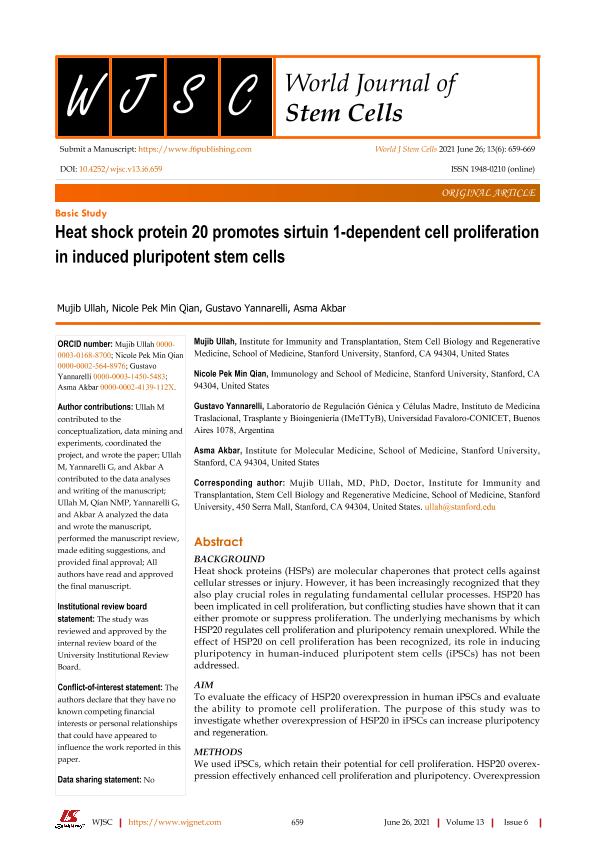Mostrar el registro sencillo del ítem
dc.contributor.author
Ullah, Mujib
dc.contributor.author
Qian, Nicole Pek Min
dc.contributor.author
Yannarelli, Gustavo Gabriel

dc.contributor.author
Akbar, Asma
dc.date.available
2023-01-03T12:37:38Z
dc.date.issued
2021-06
dc.identifier.citation
Ullah, Mujib; Qian, Nicole Pek Min; Yannarelli, Gustavo Gabriel; Akbar, Asma; Heat shock protein 20 promotes sirtuin 1-dependent cell proliferation in induced pluripotent stem cells; Baishideng Publishing Group Co; World Journal of Stem Cells; 13; 6; 6-2021; 659-669
dc.identifier.uri
http://hdl.handle.net/11336/183114
dc.description.abstract
Background: Heat shock proteins (HSPs) are molecular chaperones that protect cells against cellular stresses or injury. However, it has been increasingly recognized that they also play crucial roles in regulating fundamental cellular processes. HSP20 has been implicated in cell proliferation, but conflicting studies have shown that it can either promote or suppress proliferation. The underlying mechanisms by which HSP20 regulates cell proliferation and pluripotency remain unexplored. While the effect of HSP20 on cell proliferation has been recognized, its role in inducing pluripotency in human-induced pluripotent stem cells (iPSCs) has not been addressed. AIM To evaluate the efficacy of HSP20 overexpression in human iPSCs and evaluate the ability to promote cell proliferation. The purpose of this study was to investigate whether overexpression of HSP20 in iPSCs can increase pluripotency and regeneration. Methods: We used iPSCs, which retain their potential for cell proliferation. HSP20 overexpression effectively enhanced cell proliferation and pluripotency. Overexpression of HSP20 in iPSCs was characterized by immunocytochemistry staining and realtime polymerase chain reaction. We also used cell culture, cell counting, western blotting, and flow cytometry analyses to validate HSP20 overexpression and its mechanism. Results: This study demonstrated that overexpression of HSP20 can increase the pluripotency in iPSCs. Furthermore, by overexpressing HSP20 in iPSCs, we showed that HSP20 upregulated proliferation markers, induced pluripotent genes, and drove cell proliferation in a sirtuin 1 (SIRT1)-dependent manner. These data have practical applications in the field of stem cell-based therapies where the mass expansion of cells is needed to generate large quantities of stem cell-derived cells for transplantation purposes. Conclusion: We found that the overexpression of HSP20 enhanced the proliferation of iPSCs in a SIRT1-dependent manner. Herein, we established the distinct crosstalk between HSP20 and SIRT1 in regulating cell proliferation and pluripotency. Our study provides novel insights into the mechanisms controlling cell proliferation that can potentially be exploited to improve the expansion and pluripotency of human iPSCs for cell transplantation therapies. These results suggest that iPSCs overexpressing HSP20 exert regenerative and proliferative effects and may have the potential to improve clinical outcomes.
dc.format
application/pdf
dc.language.iso
eng
dc.publisher
Baishideng Publishing Group Co
dc.rights
info:eu-repo/semantics/openAccess
dc.rights.uri
https://creativecommons.org/licenses/by-nc/2.5/ar/
dc.subject
HEAT SHOCK PROTEIN 20
dc.subject
HEAT SHOCK PROTEINS
dc.subject
INDUCED PLURIPOTENT STEM CELLS
dc.subject
PLURIPOTENCY
dc.subject
PROLIFERATION
dc.subject
SIRTUIN-1
dc.subject
STEM CELLS
dc.subject.classification
Bioquímica y Biología Molecular

dc.subject.classification
Ciencias Biológicas

dc.subject.classification
CIENCIAS NATURALES Y EXACTAS

dc.title
Heat shock protein 20 promotes sirtuin 1-dependent cell proliferation in induced pluripotent stem cells
dc.type
info:eu-repo/semantics/article
dc.type
info:ar-repo/semantics/artículo
dc.type
info:eu-repo/semantics/publishedVersion
dc.date.updated
2022-09-22T00:40:57Z
dc.identifier.eissn
1948-0210
dc.journal.volume
13
dc.journal.number
6
dc.journal.pagination
659-669
dc.journal.pais
Estados Unidos

dc.journal.ciudad
California
dc.description.fil
Fil: Ullah, Mujib. University of Stanford; Estados Unidos
dc.description.fil
Fil: Qian, Nicole Pek Min. University of Stanford; Estados Unidos
dc.description.fil
Fil: Yannarelli, Gustavo Gabriel. Consejo Nacional de Investigaciones Científicas y Técnicas. Oficina de Coordinación Administrativa Houssay. Instituto de Medicina Traslacional, Trasplante y Bioingeniería. Fundación Favaloro. Instituto de Medicina Traslacional, Trasplante y Bioingeniería; Argentina
dc.description.fil
Fil: Akbar, Asma. University of Stanford; Estados Unidos
dc.journal.title
World Journal of Stem Cells
dc.relation.alternativeid
info:eu-repo/semantics/altIdentifier/url/https://www.wjgnet.com/1948-0210/full/v13/i6/659.htm
dc.relation.alternativeid
info:eu-repo/semantics/altIdentifier/doi/http://dx.doi.org/10.4252/wjsc.v13.i6.659
Archivos asociados
